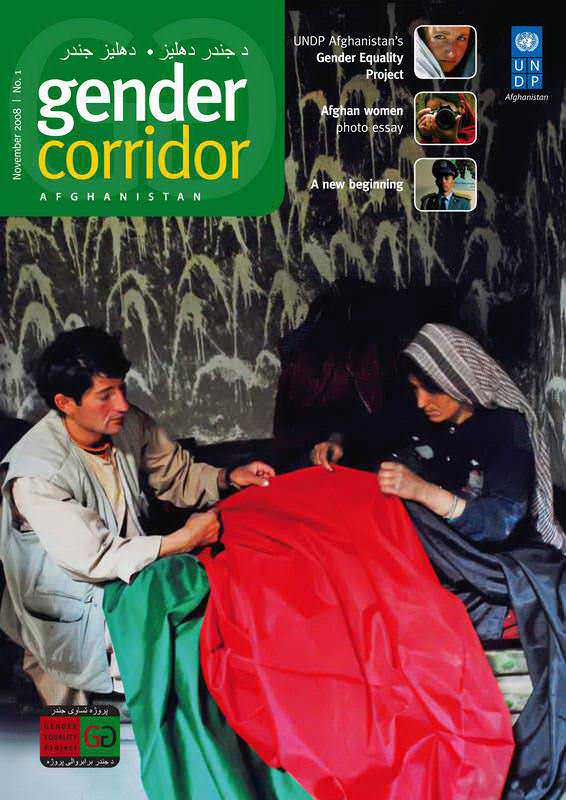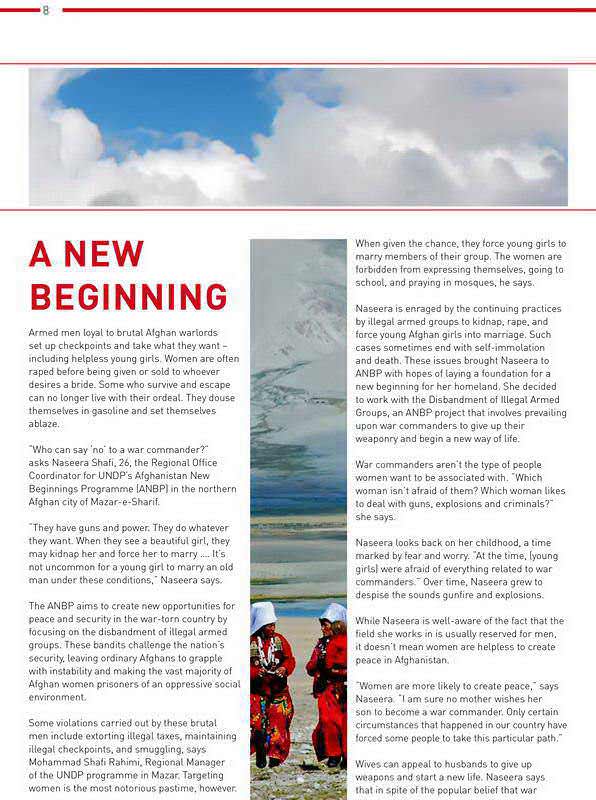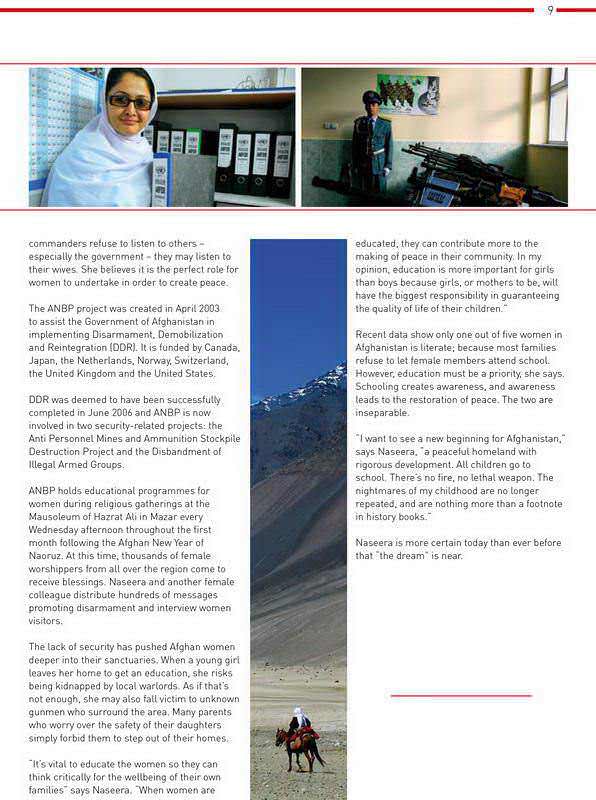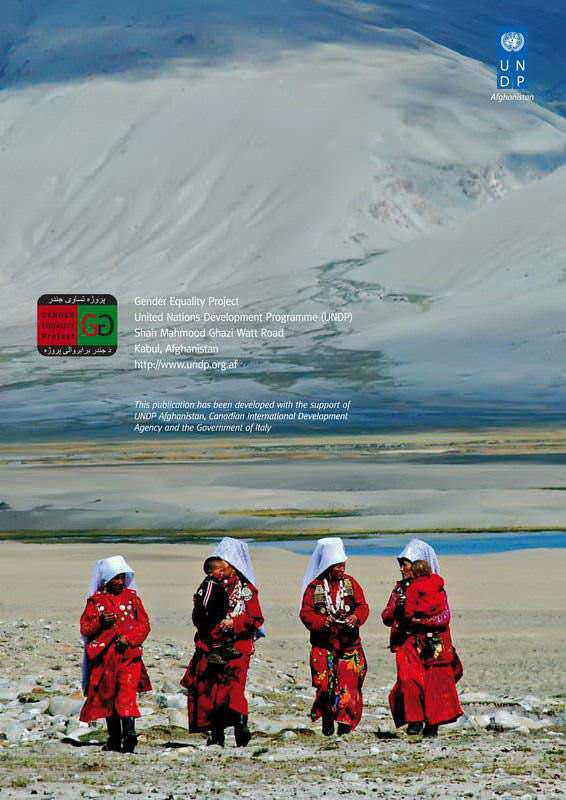Gender Corridor Afghanistan (2008): A New Beginning

Gender Corridor Afghanistan, November 2008
“Gender Corridor Afghanistan” is the publication of Gender Equality Project of UNDP Afghanistan.
A NEW BEGINNING

Armed men loyal to brutal Afghan warlords set up checkpoints and take what they want – including helpless young girls. Women are often raped before being given or sold to whoever desires a bride. Some who survive and escape can no longer live with their ordeal. They douse themselves in gasoline and set themselves ablaze.
“Who can say ‘no’ to a war commander?” asks Naseera Shafi, 26, the Regional Office Coordinator for UNDP’s Afghanistan New Beginnings Programme (ANBP) in the northern Afghan city of Mazar-e-Sharif.
“They have guns and power. They do whatever they want. When they see a beautiful girl, they may kidnap her and force her to marry …. It’s not uncommon for a young girl to marry an old man under these conditions,” Naseera says.
The ANBP aims to create new opportunities for peace and security in the war-torn country by focusing on the disbandment of illegal armed groups. These bandits challenge the nation’s security, leaving ordinary Afghans to grapple with instability and making the vast majority of Afghan women prisoners of an oppressive social environment.
Some violations carried out by these brutal men include extorting illegal taxes, maintaining illegal checkpoints, and smuggling, says Mohammad Shafi Rahimi, Regional Manager of the UNDP programme in Mazar. Targeting women is the most notorious pastime, however. When given the chance, they force young girls to marry members of their group. The women are forbidden from expressing themselves, going to school, and praying in mosques, he says.
Naseera is enraged by the continuing practices by illegal armed groups to kidnap, rape, and force young Afghan girls into marriage. Such cases sometimes end with self-immolation and death. These issues brought Naseera to ANBP with hopes of laying a foundation for a new beginning for her homeland. She decided to work with the Disbandment of Illegal Armed Groups, an ANBP project that involves prevailing upon war commanders to give up their weaponry and begin a new way of life.
War commanders aren’t the type of people women want to be associated with. “Which woman isn’t afraid of them? Which woman likes to deal with guns, explosions and criminals?” she says.
Naseera looks back on her childhood, a time marked by fear and worry. “At the time, (young girls) were afraid of everything related to war commanders.” Over time, Naseera grew to despise the sounds gunfire and explosions.
While Naseera is well-aware of the fact that the field she works in is usually reserved for men, it doesn’t mean women are helpless to create peace in Afghanistan. “Women are more likely to create peace,” says Naseera. “I am sure no mother wishes her son to become a war commander. Only certain circumstances that happened in our country have forced some people to take this particular path.”
Wives can appeal to husbands to give up weapons and start a new life. Naseera says that in spite of the popular belief that war commanders refuse to listen to others – especially the government – they may listen to their wives. She believes it is the perfect role for women to undertake in order to create peace.

The ANBP project was created in April 2003 to assist the Government of Afghanistan in implementing Disarmament, Demobilization and Reintegration (DDR). It is funded by Canada, Japan, the Netherlands, Norway, Switzerland, the United Kingdom and the United States.
DDR was deemed to have been successfully completed in June 2006 and ANBP is now involved in two security-related projects: the Anti Personnel Mines and Ammunition Stockpile Destruction Project and the Disbandment of Illegal Armed Groups.
ANBP holds educational programmes for women during religious gatherings at the Mausoleum of Hazrat Ali in Mazar every Wednesday afternoon throughout the first month following the Afghan New Year of Naoruz. At this time, thousands of female worshippers from all over the region come to receive blessings. Naseera and another female colleague distribute hundreds of messages promoting disarmament and interview women visitors.
The lack of security has pushed Afghan women deeper into their sanctuaries. When a young girl leaves her home to get an education, she risks being kidnapped by local warlords. As if that’s not enough, she may also fall victim to unknown gunmen who surround the area. Many parents who worry over the safety of their daughters simply forbid them to step out of their homes.
“It’s vital to educate the women so they can think critically for the wellbeing of their own families” says Naseera. “When women are educated, they can contribute more to the making of peace in their community. In my opinion, education is more important for girls than boys because girls, or mothers to be, will have the biggest responsibility in guaranteeing the quality of life of their children.”
Recent data show only one out of five women in Afghanistan is literate; because most families refuse to let female members attend school. However, education must be a priority, she says. Schooling creates awareness, and awareness leads to the restoration of peace. The two are inseparable.
“I want to see a new beginning for Afghanistan,” says Naseera, “a peaceful homeland with rigorous development. All children go to school. There’s no fire, no lethal weapon. The nightmares of my childhood are no longer repeated, and are nothing more than a footnote in history books.”
Naseera is more certain today than ever before that “the dream” is near.







Seperti itu sekalikah? statemen yang mereka gunakan sepertinya terlalu berlebihan dan menyudutkan dan juga seolah ingin menunjukkan kepada dunia betapa buruknya prilaku suatu bangsa dan betapa mereka memang layak berada di sana membawa secercah harapan. Saya yakin tidak seperti itu, apa lagi foto yang ditampilkan adalah foto mas Agus di daerah Pamir.